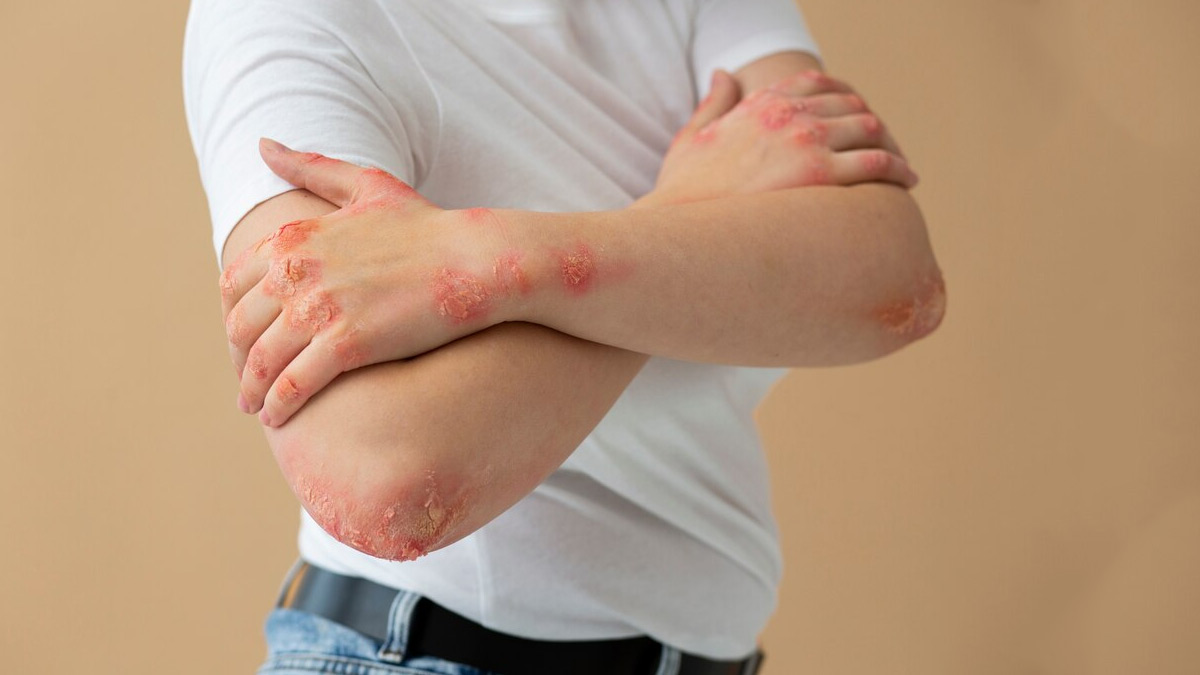
Psoriasis, a chronic autoimmune disease, can have a significant impact on a person's quality of life due to its skin symptoms and associated inflammation. While medical treatments are available to alleviate psoriasis symptoms, adopting a curated diet can be a valuable complementary approach to managing this condition effectively. We spoke to our expert Dr Pradeep Mahajan, Regenerative Medicine Researcher and Founder, StemRx BioScience Solutions, India, who listed foods to eat and avoid for psoriasis patients.
Table of Content:-

Dr Mahajan said, “Psoriasis is characterised by chronic inflammation and an overactive immune system, both of which play pivotal roles in the development and progression of the disease. Dietary choices can significantly influence these factors, making it essential for individuals with psoriasis to consider their food intake carefully.” He emphasised the importance of an anti-inflammatory and gluten-free diet with minimal sugar intake.
Key Dietary Guidelines for Psoriasis Patients

Millet and Gluten-Free Foods
One of the primary dietary recommendations for individuals with psoriasis is the inclusion of gluten-free foods. Dr Mahajan said, “Gluten, a protein found in wheat, barley, and rye, can trigger inflammation in some individuals, exacerbating psoriasis symptoms.” Substituting gluten-containing grains with gluten-free alternatives like millet is a smart choice. Millet is a gluten-free grain that is nutrient-dense and can be an excellent addition to a psoriasis-friendly diet.
Also Read: Dry Scalp On Your Body? Expert Explains Impact Of Psoriasis And Importance Of Early Detection
Say No To Sugar
Another critical aspect of managing psoriasis through diet is minimising sugar intake. Dr Mahajan added, “High sugar consumption can lead to increased inflammation and may worsen psoriasis symptoms. Patients should avoid sugary snacks, sugary beverages, and processed foods that often contain hidden sugars.” Instead, opt for natural sweeteners like honey or maple syrup in moderation when needed.

Anti-Inflammatory Foods for Psoriasis Patients
Dr Mahajan listed anti-inflammatory foods that psoriasis patients should add to their diet to reduce inflammation and support the immune system
- Foods rich in antioxidants: Berries, leafy greens, and colourful fruits and vegetables are packed with antioxidants that can help neutralise harmful free radicals and reduce inflammation.
- Omega-3 Fatty Acids: Fatty fish like salmon, mackerel, and sardines are rich sources of omega-3 fatty acids, which have anti-inflammatory properties. These can help alleviate psoriasis symptoms.
- Phytochemicals: Foods containing phytochemicals, such as turmeric, ginger, and green tea, have been shown to have anti-inflammatory effects and may contribute to managing psoriasis symptoms.
Also Read: From Lyme Disease To Psoriasis: Expert Lists Diseases That Mimic Rheumatoid Arthritis
Dietary Factors to Avoid
Conversely, psoriasis patients should minimise or eliminate some food from their diets. Dr Mahajan listed them as follows:
- Processed Foods: Processed foods often contain unhealthy trans fats and high levels of sodium, which can exacerbate inflammation and negatively impact overall health.
- Saturated Fats: Foods high in saturated fats, like red meat and full-fat dairy products, can contribute to inflammation and should be consumed sparingly.

Mediterranean Diet
According to Johns Hopkins Medicine, adopting a Mediterranean diet as a part of the management of psoriasis can help diminish chronic inflammation, which is known to contribute to the risk of developing heart disease, type 2 diabetes, and various other health issues.
Bottomline
Dr Mahajan concluded, “By making informed dietary choices, individuals with psoriasis can potentially alleviate their symptoms and improve their overall well-being, complementing medical treatment and enhancing their quality of life. Also, always consult with a healthcare professional or registered dietitian for personalised dietary recommendations tailored to your specific needs and health conditions.”
[Disclaimer: This article contains information shared by a registered healthcare professional and is for informational purposes only. Hence, we advise you to consult your expert before making any changes in your diet.]
Also watch this video
How we keep this article up to date:
We work with experts and keep a close eye on the latest in health and wellness. Whenever there is a new research or helpful information, we update our articles with accurate and useful advice.
Current Version